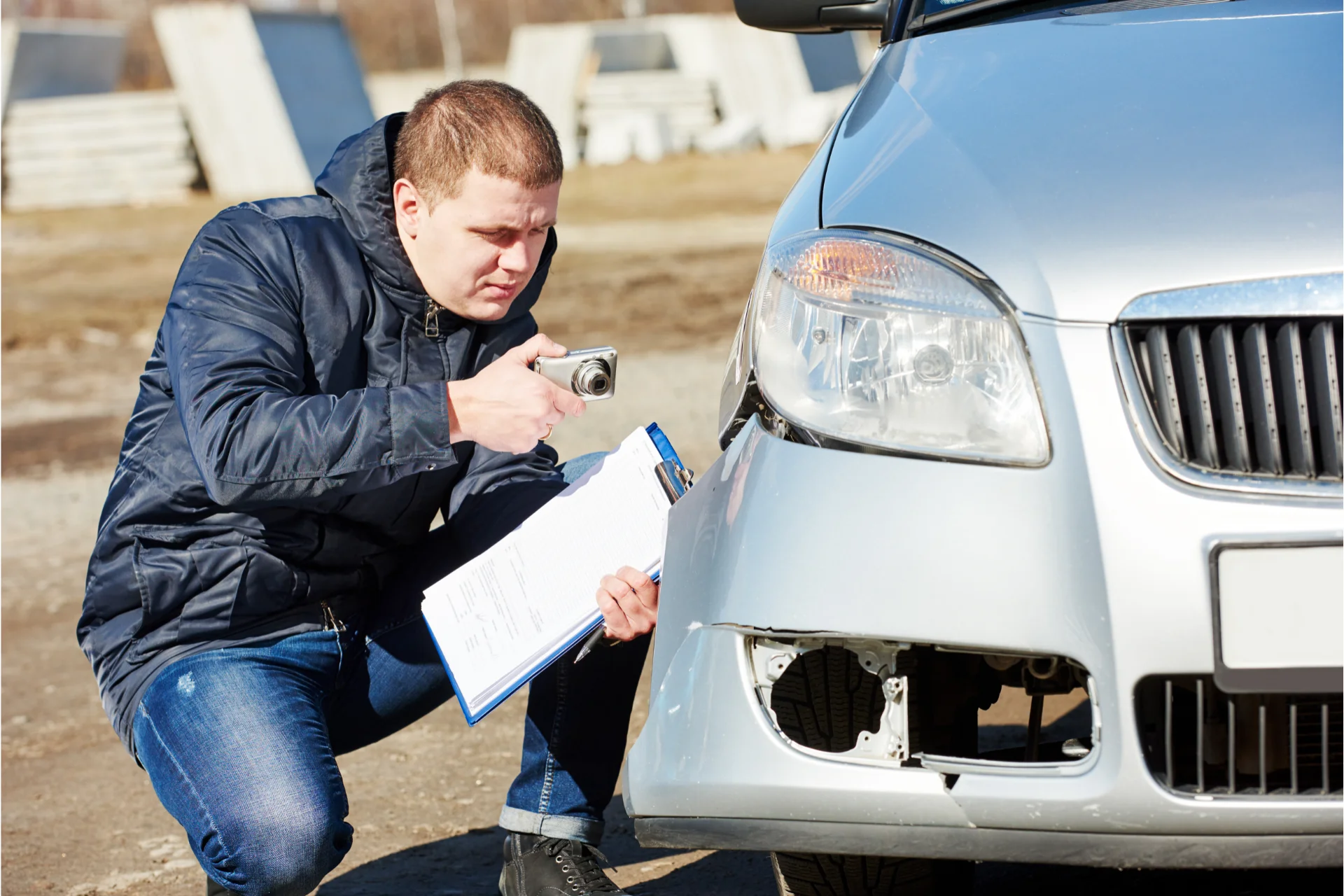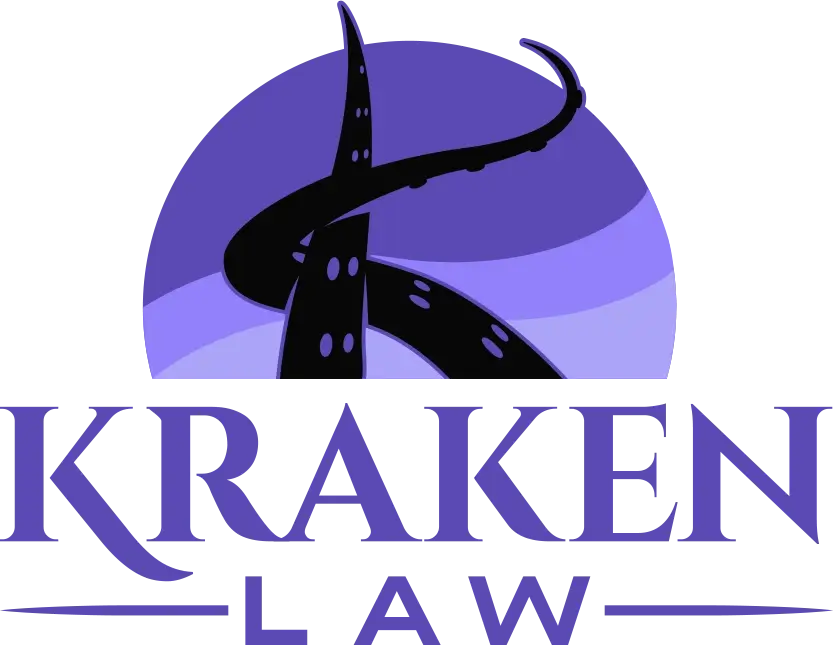A motor accident can be shocking and confusing for many people. You may not know how to deal with the overwhelming bills due to injuries and car damage.
Remember insurance coverage always comes into play when dealing with car accidents. This is why you may be curious about who pays for car damage in a no-fault state.
We have sound knowledge about who pays for car damage in a no-fault state, so we’ll be guiding you today.
No-Fault State Meaning
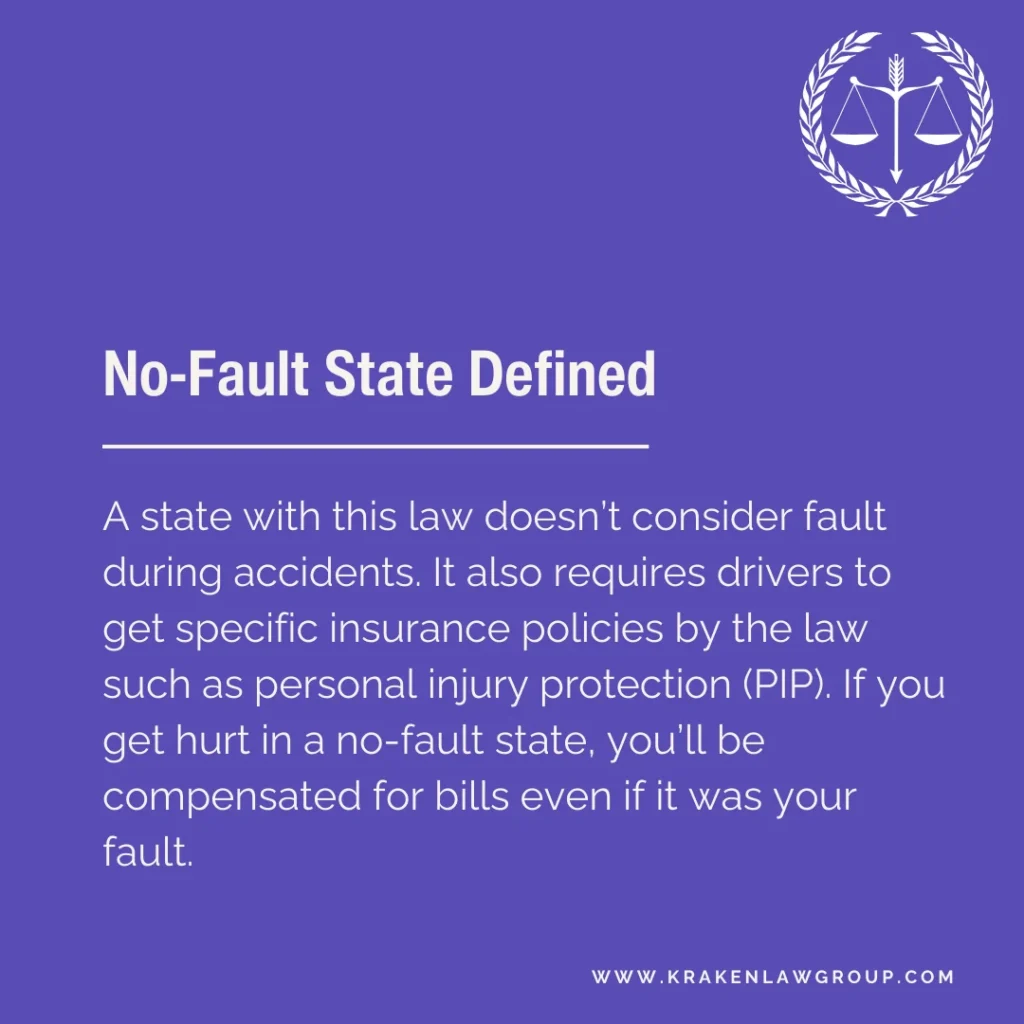
Before you can learn who pays for car damage in a no-fault state, you must understand the no-fault state meaning. A state with this law doesn’t consider fault during accidents.
It also requires drivers to get specific insurance policies by the law such as personal injury protection (PIP). If you get hurt in a no-fault state, you’ll be compensated for bills even if it was your fault.
The law ensures that every person is responsible for their own protection during accidents. This means you must have the necessary insurance policy by the law to cover your damages.
Of course, specific factors will affect the amount you can receive and whether you’re eligible for it. For example, if you don’t have PIP in Florida, you cannot receive coverage for accidents when you’re at fault.
Fault Vs. No-Fault States
When determining who pays for car damage in a no-fault state, you must understand the legal conditions. In states where the fault is considered for accidents, the at-fault party pays all bills of the victim.
However, that is not true for no-fault states. Some damages in these states are covered by your insurance company. Meanwhile, the at-fault party will cover the remaining damages.
As of 2024, there are 12 no-fault states in the US:
- Florida
- New Jersey
- Kansas
- Michigan
- New York
- Kentucky
- Minnesota
- North Dakota
- Pennsylvania
- Massachusetts
- Utah
- Hawaii
An unincorporated territory called Puerto Rico in the US also follows no-fault state laws for accidents.
Does Personal Injury Cover Car Damages?
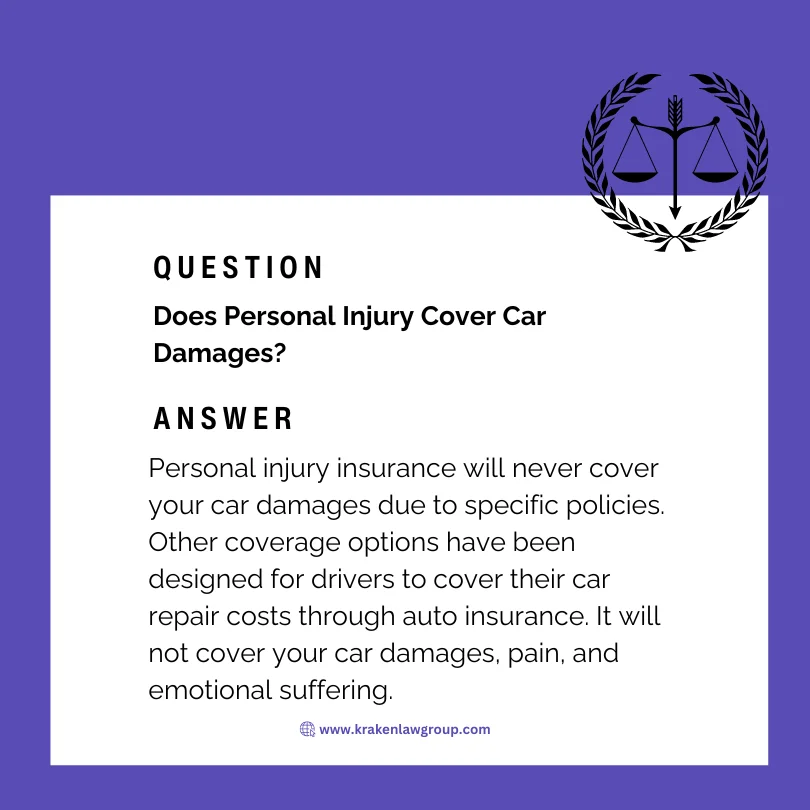
Personal injury insurance will never cover your car damages due to specific policies. Other coverage options have been designed for drivers to cover their car repair costs through auto insurance.
Typically, a PIP policy will cover:
- Medical bills
- Lost wages
- Rehabilitation expenses
- Replacement services
It will not cover your car damages, pain, and emotional suffering. This is why you must know who pays for car damage in a no-fault state.
Pros And Cons Of Florida’s No-Fault State Law
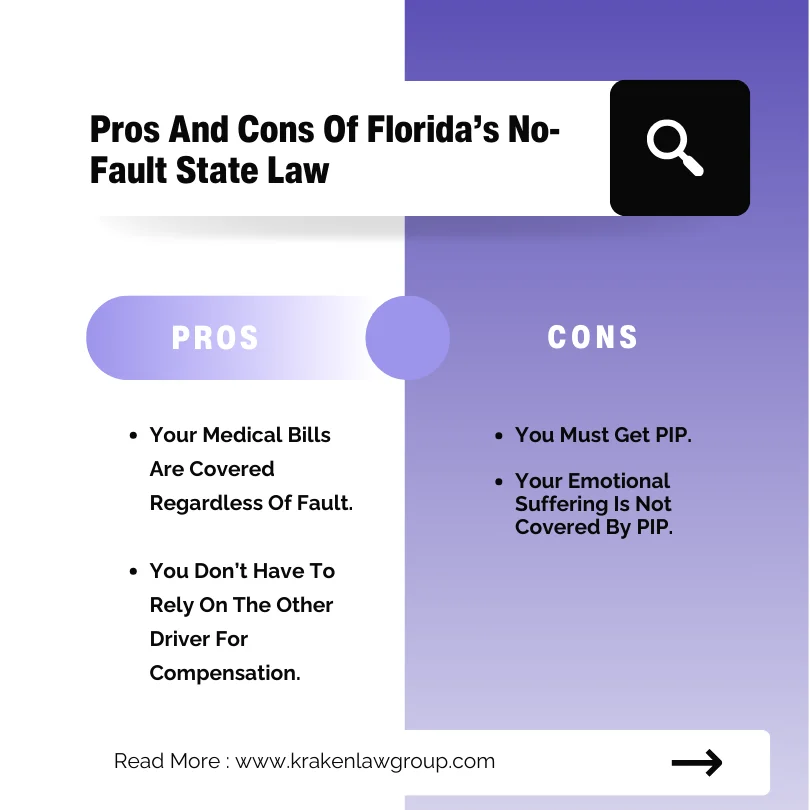
Let’s look at the pros and cons of no-fault state laws:
Pros Of No-Fault State Law
Pro#1 Your Medical Bills Are Covered Regardless Of Fault
Many people are overwhelmed with medical bills after car accidents. You may be worried that your monthly salary wouldn’t be enough to pay the hospital.
The at-fault party may also not have insurance to cover your damages. In hit-and-run cases, the drivers are unknown. This means getting their insurance adjuster information will not be possible.
In such cases, no-fault state laws can come to your rescue. These states make PIP a requirement for anyone getting auto insurance. The best thing about the mandatory policy is it will cover you during accidents.
Your insurance adjuster will not ask you whose fault the accident was before approving your claim. The policy is also beneficial in hit-and-run cases because you won’t be requiring the at-fault party’s information.
Pro# 2 You Don’t Have To Rely On The Other Driver For Compensation
The primary purpose of no-fault laws is to ensure drivers don’t rely on other people for their medical bills. Your PIP coverage will compensate for your lost income and specific out-of-pocket expenses.
This means you’ll not have to worry about the other driver admitting their fault. You’ll also not have to convince the at-fault party to offer you a reasonable settlement.
The best thing is you’ll not be burdened with expenses if the accident was your fault. In states with fault laws, the insurance company will determine who caused the accident.
If the accident was due to your negligence, your insurance company will not cover your damages. You also cannot file a claim with the other driver’s insurance adjuster.
That is why no-fault state laws ensure you don’t have to rely on the other driver. It also prevents you from getting burdened with expenses due to your fault.
Cons Of No-Fault State Law
Con#1 You Must Get PIP
No-fault state laws make it easy to recover damages after car accidents. However, they also have disadvantages.
In such states, you must get specific policies in addition to your overall auto insurance. This means your annual premium rate will be higher than expected.
Some states also set specific values for the insurance coverage you must have. For example, Florida requires you to have at least $10,000 PIP in insurance.
As the minimum value rises, the premium rate also increases. You may not want to pay for these additional costs. That is why the PIP requirement is burdening for many drivers.
Con# 2 Your Emotional Suffering Is Not Covered By PIP
Personal injury protection has some limitations that you cannot overlook. For example, it will not cover your emotional suffering. The policy also doesn’t compensate for physical pain.
So you must file a claim with the at-fault party’s insurance adjuster to seek financial compensation for pain and suffering. If you were at fault, you cannot receive coverage for these things.
This is also true if the at-fault driver doesn’t have auto insurance. Another thing that PIP cannot cover is car damage.
You will have to initiate a claim against the other driver for car repair costs if they were at fault. There are also other options for coverage.
This is why people wonder often about who pays for car damage in a no-fault state.
What Happens When You Get In A Car Crash In A No-Fault State?
There are usually two scenarios when a person gets into a car accident in a no-fault state. Understanding them will help you later with who pays for car damage in a no-fault state.
You’re At Fault For The Crash
If you’re at fault for an accident in a no-fault state, you can still receive compensation. This is true if you have sufficient PIP as per your state’s legal requirement.
For example, if you’re in Florida you must have $10,000 in PIP. If you meet this requirement, you can initiate a claim with your own insurance company.
The company will ask for your medical records and proof of expenses before approving your request. If they do approve the claim, the insurance company will cover your bills.
This means you’ll not have to pay out of your pocket for medical expenses and recovery costs in no-fault states.
However, you may still have to cover your car repair costs if you don’t have another auto insurance coverage.
Another Driver Is At Fault For The Crash
If you’re in a crash caused by another party in a no-fault state, some of your damages will be covered by the other driver. The legally required PIP insurance will cover your medical bills and lost income.
However, you’ll not receive coverage for car damages through PIP. If the other driver is at fault, their insurance company must cover your vehicle repair costs.
You may also have other options for who pays for car damage in a no-fault state, depending on your auto insurance.
Who Pays For Car Damage In A No-Fault State?
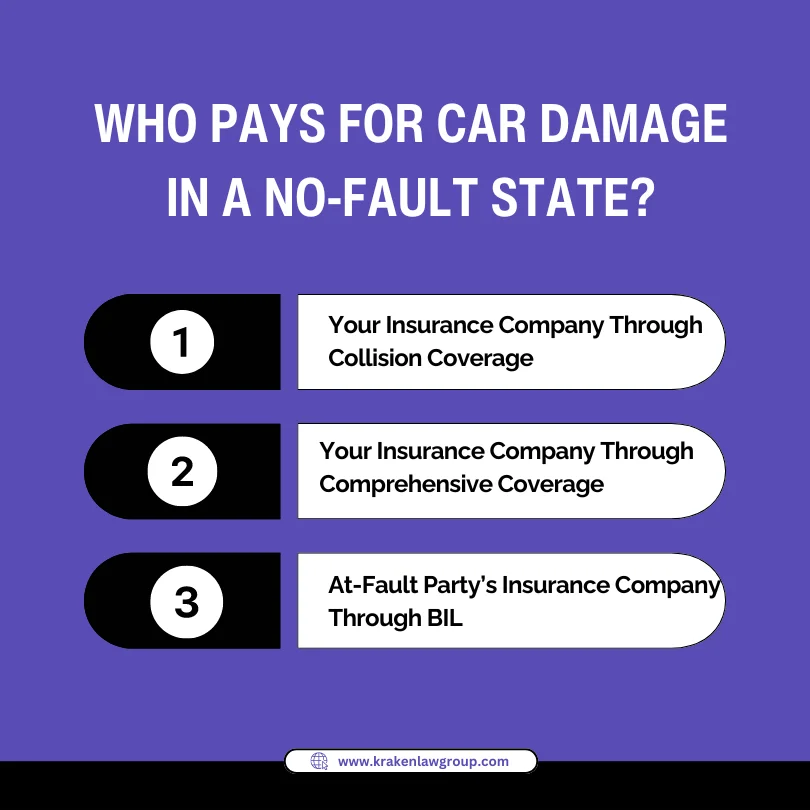
Here are the three options for who pays for car damage in a no-fault state:
1. Your Insurance Company Through Collision Coverage
The answer for who pays for car damage in a no-fault state can be your insurance company if you have collision coverage. This policy will be effective if your car collides with:
- Another vehicle such as a truck or bike
- Another structure such as a wall, tree, or railing
Regardless of fault, you can file a claim with your own insurance company. The agency will investigate your expenses and determine whether you should receive compensation.
Such coverage is also helpful in cases where you’re not at fault. For example, in hit-and-runs, you’ll have to pay car damages yourself unless you have collision or comprehensive coverage.
2. Your Insurance Company Through Comprehensive Coverage
Another answer to who pays for car damage in a no-fault state can be your comprehensive auto insurance coverage. This policy covers damages that are not due to a collision.
For example, a person may damage your car with a baseball bat in a rage act. Someone may also vandalize your vehicle by painting it with a spray.
Whatever the case, you can seek compensation through comprehensive insurance.
You’ll have to initiate a claim with your own insurance adjuster for such cases. This policy is also applicable in car theft cases.
3. At-Fault Party’s Insurance Company Through Bodily Liability Insurance (BIL)
You may not have to worry about who pays for car damage in a no-fault state if you’re not at fault. In such states, the at-fault driver can be held liable for car damages.
This is especially true if the other driver has a BIL policy. You’ll have to initiate a claim with the at-fault party’s insurance adjuster.
Once you make a claim with evidence, the agency will investigate the case. They may offer a settlement amount if they find the crash details to be consistent with your evidence.
The best thing is that you won’t have to worry if you don’t have collision or comprehensive auto insurance.
The Role Of Personal Injury Insurance In A No-Fault State
The main role of personal injury insurance is that it reduces the burden on vehicle owners. Every party’s agency will be responsible for their medical bills and lost wages.
It also reduces the investigative burden of insurance companies. That is because the agency only has to ensure your expenses align with injuries due to the accident.
They will not have to investigate comprehensively to determine the exact fault. Personal injury insurance also benefits those involved in hit-and-run cases.
How To File A Claim With Your Insurance Company
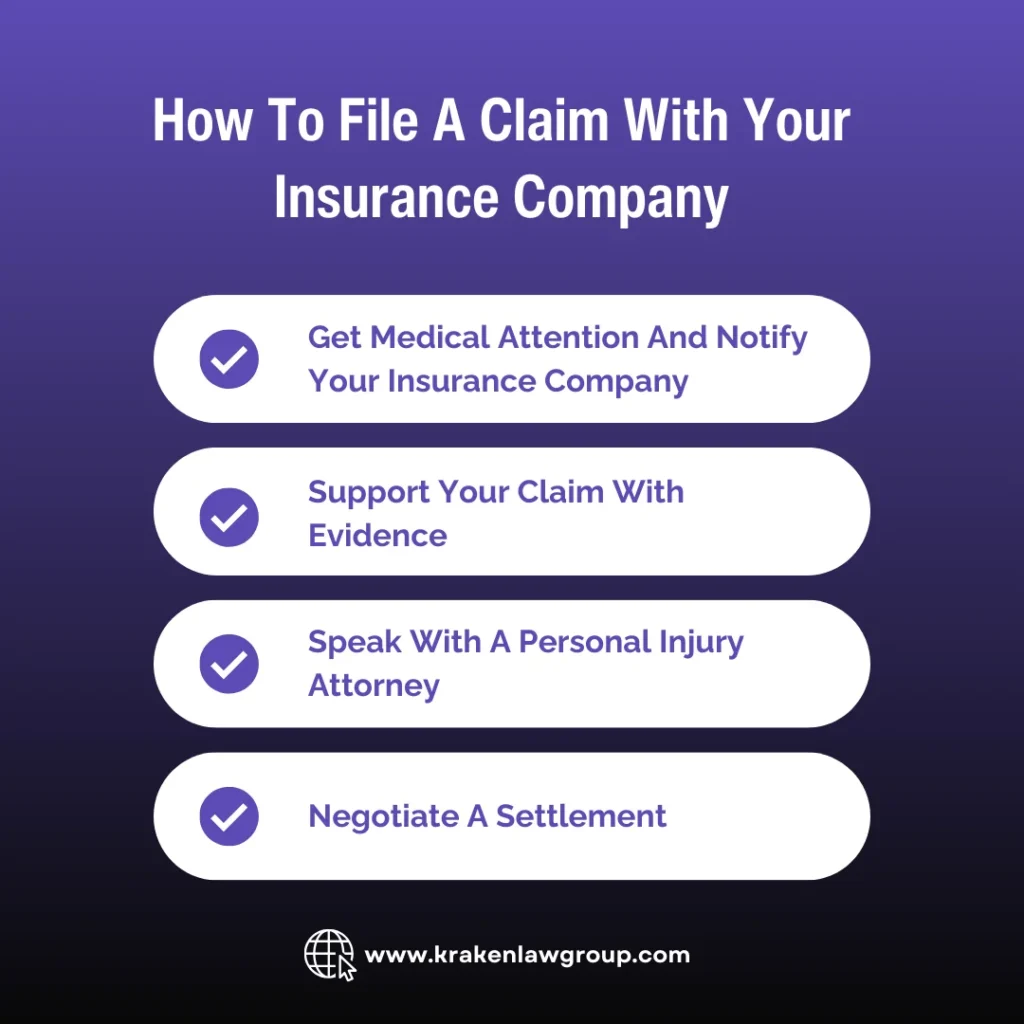
Now that you know who pays for car damage in a no-fault state, you may wonder how to file a claim.
The procedure of filing remains the same whether you’re starting a case with your own insurance agency or the at-fault party’s:
1. Get Medical Attention And Notify Your Insurance Company
Always seek medical attention immediately after crashes even if the injuries are minor. This will allow you to form the first piece of evidence for an insurance claim.
Once you’re completely conscious about the crash, you must notify your insurance provider. You may call the company to talk to an agent about the accident.
If you’re healthy enough to visit the company yourself, this should be your preferred choice for notifying.
2. Support Your Claim With Evidence
You cannot get anywhere with an insurance claim if you don’t have proof to back up your information. For example, you must submit your immediate medical records to show the bills you owe the hospital.
An expert medical opinion will also be necessary to prove any future bills you may experience due to the crash injuries. You’ll also have to submit your income statements to get coverage for lost wages.
If you opt for any replacement service due to the crash injuries, you must support them with evidence. All your proof must be in written form for proper submission.
3. Speak With A Personal Injury Attorney in Winter Park Florida
Once you have filed a claim, consult an expert car accident or personal injury attorney. They can prepare you for the steps you must take while the insurance agency investigates your claim.
The lawyer may also prepare you for any meetings the insurance adjuster may schedule with you. Your attorney may also protect you from unlawful claim rejections.
4. Negotiate A Settlement
Negotiating a settlement is an essential step when dealing with insurance claims. Most companies provide a lowball offer to the claiming party to minimize their payout.
Your lawyer will guide you about the compensation offer when the insurance agency makes it. The company may also reject specific expenses that come under the PIP.
This is why settling with the company will be necessary to receive financial coverage.
Does Negligence Impact Liability?
Negligence can impact liability if you’re seeking compensation for car damage by the at-fault party. If both of you are at fault, the percentage of your negligence would be considered.
After that, it will be determined who pays for car damage in a no-fault state. For example, you may have a 25% fault in a crash because of talking on the phone while driving.
The other party may have 75% because they may be under the influence of drugs while driving. This means your compensation will decrease by 25% due to partial liability.
So, the other driver would cover 75% of your car repair costs in a no-fault state. The remaining damages may be covered by your insurance company through collision or comprehensive coverage.
If you don’t have these policies, the one who pays for car damage in a no-fault state for the remaining 25% will be you.
FAQs
How Does Insurance Work When It’s Not Your Fault?
You can seek compensation from the at-fault driver. You’ll need their insurance policy information to file a claim with their adjuster.
Who Pays For Car Damage In Florida No-Fault?
The at-fault driver mainly covers car damage in no-fault states. Your insurance company may also cover you if you have collision or comprehensive auto insurance.
Do You Have To Pay Excess If You Are Not At Fault?
PIP policy will cover about 80% of your expenses. You may file a claim with the at-fault party’s insurance agency to cover the remaining 20%. If you don’t have their information, you’ll have to pay the excess yourself.
Why Is Florida No-Fault Insurance?
Florida is a no-fault insurance state to reduce the burden on residents. This state also has one of the highest crash rates in the US. For instance, 94,912 accidents have occurred in just four months in 2024.
Contact a Personal Injury Attorney in Winter Park to File Your Claim
This is what you must know about who pays for car damage in a no-fault state. Phone us today to connect with our personal injury lawyer who can help you with accidents in Florida.

